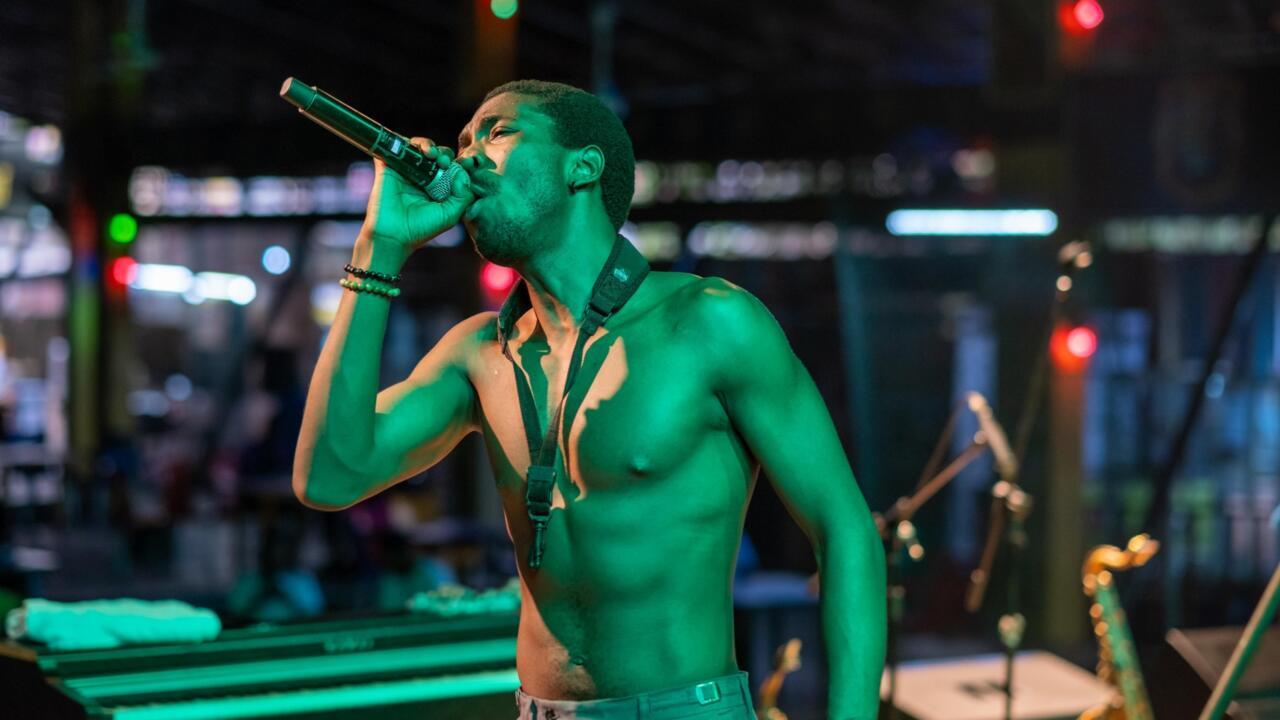With their joint double album entitled Legacy + ("Heritage +" in French), father and son are nominated this year for the Grammy Awards, the American music awards whose ceremony is held Monday in Los Angeles.
This is the fifth Grammy nomination for Femi Kuti, who began his career playing at the age of 17 alongside his father, the legendary Fela.
In the Kuti family, another son of Fela, Seun Kuti, was also nominated for the Grammies in 2018.
"My compositions are largely inspired by what I listened to as a child, the music of my grandfather Fela, of course, that of my father Femi and my uncle Seun Kuti," Made Kuti told AFP during from an interview conducted at the Shrine, Fela's legendary concert hall in Lagos.
On stage, bare-chested, fitted pants and a saxophone hanging around his neck, the resemblance between Made Kuti and her grandfather is striking.
Made Kuti, grandson of Nigerian musician and singer Fela Kuti, during a rehearsal with his band The Movement at the New Africa Shrine in Ikeja on January 19, 2022 in Lagos Benson Ibeabuchi AFP
The musician runs his fingers over the family instrument while leading his group with which he rehearses "Free Your Mind", the flagship title of Legacy +, released in February 2021.
We detect rock influences, but above all the genius of Afrobeat by Fela, repetitive and hypnotic music mixing highlife style, Yoruba polyrhythm, jazz and funk.
zombie
The calm and calm attitude contrasts with that of his grandfather, nervous and exuberant.
The words have remained the same: engaged.
Throughout his career, Fela Kuti has consistently denounced elite corruption, dictatorship and corporate power, using music as a weapon.
Nigerian musician Femi Kuti, son of Afrobeat inventor Fela Kuti, in concert in Adidjan, April 28, 2019 SIA KAMBOU AFP/Archives
“Nigerians see Fela as a figure of freedom and justice, a revolutionary spirit that empowers you to fight for what you believe,” says Made Kuti.
After the release of the antimilitarist album Zombie (1976), his residence, founded as the Kalakuta Republic, was completely razed in a military assault.
Fela will be imprisoned and tortured several times.
“Fela was certainly one of the most talented musicians, but also an incredible source of sincerity, integrity and passion,” adds his grandson.
A quarter of a century after his death, Femi and Made Kuti denounce the same evils.
Nigeria is no longer a military dictatorship, and returned to democracy in 1999, but endemic corruption, extreme poverty, glaring inequalities and abuses have persisted.
Nigerian musician, composer and singer Made Kuti at the New Afrika Shrine on January 19, 2022 in Lagos Benson Ibeabuchi AFP
In "Different Streets", one of his songs, Made sings, like an African Lou Reed: "Grandfather did not predict the future, he spoke of what he saw (...) c It's so scary to see that we are facing the same problems as in the 70s".
commercial industry
Femi and Made certainly sing about the daily life of Nigerians, but their music is not as popular in Nigeria as Fela's was.
The father and son, however, draw crowds during their tours of European cities, as well as at the Shrine, reopened in 2000 by Femi and where music lovers, nostalgic Fela and European expats meet every weekend.
The New Africa Shrine in Lagos, January 19, 2022 in Nigeria Benson Ibeabuchi AFP
On the airwaves and in nightclubs, today's youth however prefers afropop hits, a derivative of commercial version afrobeat, worn by superstars like Davido or Wizkid, also nominated for the Grammys. awards this year.
An industry that Femi Kuti does not really see with a very good eye: "You have to distinguish between an entertaining artist and a musician", he says.
"Many artists don't compose their music, and maybe don't even write their lyrics," says the 59-year-old musician.
The lyrics of Afropop praise capitalism more than militancy, but for some time now the repertoire has widened, and the lyrics have become more political... just like the image of Nigerian youth.
Nigerian musician, conductor, composer and singer Fela Kuti, on April 6, 1993 in Lagos ADE OBISESAN AFP / Archives
Long described as resilient or even apolitical, Nigerians indeed took to the streets en masse in October 2020, to protest against police violence and poor governance, in a historic movement initiated in particular by local music stars.
During these peaceful demonstrations, quickly repressed in blood by the army and the police, the young people danced on the music of their parents: "Sorrow, Tears and Blood" (Sorrow, tears and blood) or "Zombie" of Fela.
Proof that the legacy of this genius musician is not just a family affair.
It is also the story of a country.
© 2022 AFP

